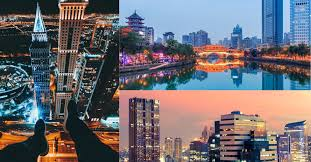Now Reading: How Residency Visas Are Changing Real Estate Hotspots Fast Now 2025
-
01
How Residency Visas Are Changing Real Estate Hotspots Fast Now 2025
How Residency Visas Are Changing Real Estate Hotspots Fast Now 2025

In today’s globalized world, real estate and immigration have become tightly connected. Countries across the globe are changing their visa and residency laws to attract foreign investors—especially those who are willing to buy property. These changes are not just about attracting money; they are reshaping entire housing markets, changing prices, and even influencing local economies.
Let’s explore how visa residency laws are affecting global property markets and what it means for both investors and locals.
The Rise of “Golden Visas”

One of the biggest trends in global real estate is the rise of “Golden Visa” programs. These are schemes that allow foreign investors to get residency—or even citizenship—in exchange for investing a certain amount of money in real estate.
Countries like Portugal, Spain, Greece, and the United Arab Emirates have offered such programs. They promise easy travel, long-term stays, and sometimes tax benefits, just for buying property.
For example, Portugal’s Golden Visa program allowed foreigners to gain residency by investing €500,000 in property. This attracted thousands of wealthy investors, especially from China, the U.S., and Brazil. Property prices soared, especially in Lisbon and Porto. However, after concerns over housing affordability, Portugal began tightening rules in 2023.
Why Countries Offer These Programs

Governments use property-based visa programs to:
- Boost foreign investment
- Attract wealthy individuals and digital nomads
- Support the construction and real estate industries
- Revive rural or underdeveloped areas
In Greece, real estate investment helped rescue the economy after the 2008 crisis. In Dubai, luxury real estate sales surged in 2022 after the UAE relaxed its visa rules.
But there’s a downside: local buyers often can’t compete with foreign wealth. In cities like Vancouver, London, and Sydney, foreign investment is partly blamed for driving up prices, leading to housing shortages for locals.
Top Countries with Real Estate Residency Programs

Let’s look at some popular countries that offer visas through property investment:
1. Portugal
- Golden Visa requires €500,000 (or €350,000 in older areas).
- Led to a boom in property sales from foreign buyers.
- In 2023, the government began phasing out the program in big cities to fight rising rents.
2. Greece
- Requires €250,000 investment—one of Europe’s lowest thresholds.
- Foreign buyers drove prices up, especially in Athens and Santorini.
- Greece recently increased the threshold to €500,000 in high-demand areas.
3. Spain
- Golden Visa starts at €500,000 in real estate.
- Popular among Latin American, Russian, and Chinese buyers.
- Government is now considering ending the program due to housing concerns.
4. United Arab Emirates (UAE)
- Dubai offers 10-year residency for investors and property owners.
- Foreigners make up 90% of the population.
- Looser visa rules led to a boom in luxury real estate.
5. Turkey
- Citizenship by investment for a $400,000 property purchase.
- Popular with buyers from Russia, Iran, and the Middle East.
- The Turkish lira’s fall made property cheaper for foreign investors.
Digital Nomads and Remote Work Visas
Another rising trend is the “Digital Nomad Visa.” Countries like Estonia, Barbados, Costa Rica, and Indonesia now offer long-term visas to remote workers who meet minimum income levels.
While these programs aren’t based on buying property, they still influence rental markets. In cities like Bali, Lisbon, and Tbilisi, rental prices are rising as digital nomads move in and landlords shift to short-term leases.
Impact on Local Housing Markets
Visa residency laws can greatly affect local property prices and availability. Here’s how:
- Price Increases: More demand from international buyers often leads to rising home prices.
- Limited Supply: Local buyers struggle to afford homes, especially in cities with housing shortages.
- Gentrification: Wealthier foreigners drive development, but long-time residents may be pushed out.
- Luxury Focus: Developers build high-end homes, ignoring middle-class or affordable housing needs.
In Lisbon, some locals protested Golden Visas, saying they were priced out of their own neighborhoods. Similar concerns are growing in Athens, Dubai, and parts of Mexico.
Changing Laws and Future Trends
In response to criticism, many governments are reviewing their residency-by-investment programs. Portugal and Ireland have scaled back. Spain is discussing ending its Golden Visa program. Canada has already banned foreign home buyers for two years (starting in 2023).
However, new markets are opening. Countries in Eastern Europe, the Caribbean, and Southeast Asia are still promoting these schemes to attract foreign dollars.
Experts believe future programs will be more targeted—focusing on specific regions or lower-cost areas, and with stronger controls to prevent housing bubbles.
What Investors and Buyers Should Know
If you’re thinking of investing in property for a visa, keep these tips in mind:
- Check local rules: Visa laws can change fast. What works today might not tomorrow.
- Understand taxes: Some countries have complex tax rules for foreigners.
- Research the market: High prices don’t always mean good investment returns.
- Think long-term: Don’t buy just for a visa—make sure it’s a solid property.
Conclusion
Visa residency laws are more than just immigration policies—they’re powerful tools that shape global real estate markets. As countries compete for investment, property buyers gain access to new opportunities. But with rising concerns over affordability and inequality, expect more changes in the years ahead.
Whether you’re an investor or just watching the market, it’s important to stay informed about how these visa rules can impact prices, availability, and the future of housing around the world.
Read More:- Shobha Realty Launches Its Most Luxurious Project Yet—Full Details Inside 2025






















